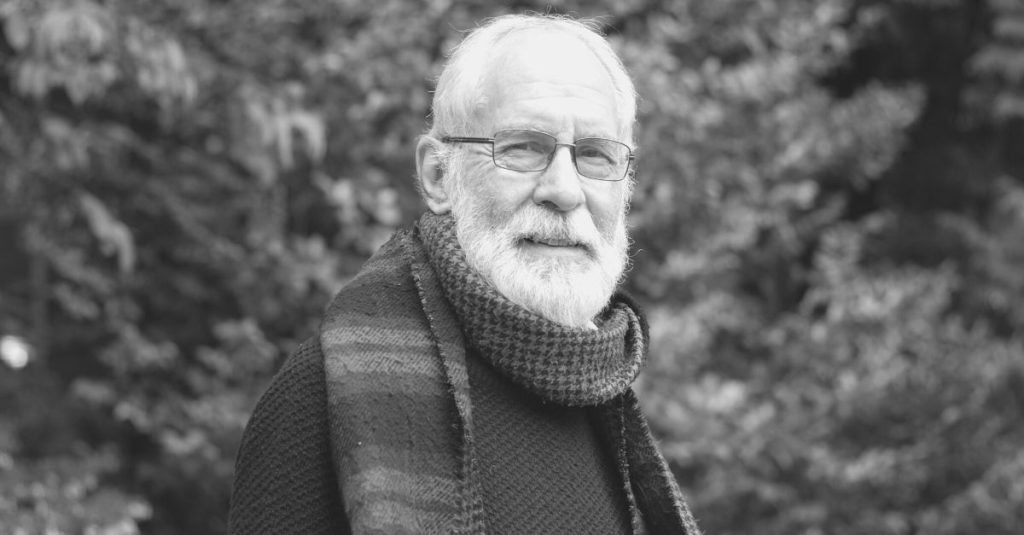

Dr. Thomas Hunter, former Lecturer in Sanskrit and South-Southeast Asian Studies, passed away peacefully on September 20, 2022 in his home village in Bali. He was an integral faculty member in the Department of Asian Studies for many years and was one of the core members in developing courses for the department that feature South and Southeast Asian content. He will be remembered for his scholarly rigour, enthusiasm, generosity, and open-mindedness.
Read about:
Research
Dr. Hunter’s special area of interest is the relationship of the ancient literature of South Asia and the literature of ancient Java and Bali. He looked at the Indian “court epics” called kāvya that were composed in metrical Sanskrit and how they stimulated and influenced the development of the closely related kakawin literature of Java and Bali. In his writing and course development he looked at these literary genres as one example among many cultural connections that can be traced between South and Southeast Asia – and indeed in the larger world of Asia. In his last couple years of research, he had been interested in the broader cultural and economic networks of the Indian Ocean world, beginning with the period when Indian ideas about language, culture and society helped shape the early societies of Southeast Asia and extending through the periods of the Islamic trading states and colonization.
Publications
Dr. Hunter’s published work details the history of the relationship focusing on the development of the Old Javanese language as a successful “cosmopolitan vernacular” language that has been a vehicle for cultural expression for over a millennium. His publications growing out of these studies include:
2015 “The Sanskritized Sections [of the Tanjung Tanah Manuscript].” In Uli Kozok (ed.), The Tanjung Tanah Codes of Law. Singapore: Institute of Southeast Asian Studies, pp. 239-319.
2014a “A Constant Flow of Pilgrims: Kāvya and the Early History of the Kakawin.” In Yigal Bronner, David Shulman and Gary Tubb (eds.) Innovations and Turning Points, Toward a History of Kāvya Literature. Oxford University Press, pp. 195-231.
2014b “A Distant Mirror: Innovation and Change in the East Javanese Kakawin.” In Yigal Bronner, David Shulman and Gary Tubb (eds.) Innovations and Turning Points, Toward a History of Kāvya Literature. Oxford University Press, pp. 739-786.
2013 “Correspondences and the question of commentaries,” “Echoes of a wider tradition,” “Parallels and transformations,” and “Close parallels: the fall of the sumanasa flower and the death of Indumatī” (Chapter 4). Part III, Chapters 1-4 in Worsley, Peter with S. Supomo, Thomas M. Hunter and Margaret Fletcher Sumanasāntaka, Death by a Sumanasa flower of Mpu Monaguṇa, an Old Javanese epic poem, its Indian source and Balinese Illustrations. Leiden: KITLV Press, pp. 819-925.
2011a “Translation in a World of Diglossia.” In Jan van der Putten and Ronit Ricci, Translation in Asia: Theories, Practices, Histories. Manchester, GB: St. Jerome Publishing, pp. 9-26.
2011b “Exploring the Role of Language in Early State Formation of Southeast Asia.” Nalanda-Sriwijaya Centre Working Paper No 7. This paper is available for download at: http://www.iseas.edu.sg/…/nsc_working_paper_series_7.pdf
2011c “Figures of Repetition (yamaka) in the Bhaṭṭikāvya, the Raghuvaṃśa, the Śiwagṛha Inscription and the Rāmāyaṇa Kakawin.” In Andrea Acri, Helen Creese and Arlo Griffiths (eds.) From Laṅkā Eastwards. The Kakawin Rāmāyaṇa in Literature and the Visual Arts. [Verhandelingen van het Koninklijk Instituut Voor Taal-, Land- en Volkenkunde 247] Leiden: KITLV Press, pp. 25-52. This book chapter can be accessed via Open Access at: http://www.oapen.org/search?identifier=399317;keyword=acri or via the KITLV Press at: http://www.kitlv.nl/book/show/1314
2009 “Yati, a Structural Principle in Old Javanese Versification.” Indo-Iranian Journal 52 (August), pp. 1-52.
2007a “The Body of the King, Reappraising Singhasari Period Syncretism.” Journal of Southeast Asian Studies, Vol. 38, No. 1, (February), pp. 27-53.
2007b “The Poetics of Grammar in the Javano-Balinese Tradition.” In Sergio La Porta and David Shulman (eds.) The Poetics of Grammar and the Metaphysics of Sound and Sign. [Jerusalem Studies in Language and Culture] Leiden: E.J. Brill, pp. 271-303.
Memories
In the following section, several former UBC colleagues and students provide brief reminiscences of Dr. Hunter as colleague, teacher, and friend.
Sai Diwan, Sessional Lecturer, Ph.D. student, Asian Studies, UBC
Dr Hunter was one of the first faculty members that I worked with when I joined the Department of Asian Studies. I was a student in a few of his classes and then later also a TA. He would always greet students with a warm and kind smile while he set up to begin the class. When I taught a course for the first time I found myself reaching for a lot of pedagogical resources that Dr. Hunter had shared over the years. He cared very deeply for the subjects that he taught. I am grateful that I had the chance to work with him and learn from him.
Gurinder Mann, Lecturer of Punjabi, Asian Studies, UBC:
I had the unique pleasure of meeting Dr. Tom Hunter as a graduate student at UBC. I was fortunate enough to become his Teaching Assistant and eventually had the privilege of becoming his colleague and friend. He was a remarkable academic, but also an excellent musician. I remember when I had the opportunity to sit and play music with him amongst friends. He was the oldest person in the room, however, his enthusiasm and zest for life made him appear the youngest. He was a unique and exceptional human being whose presence will always be missed.
Xinxin Wu, Lecturer of Chinese Language and Literature, Asian Studies, UBC
Tom Hunter was very gentle and very nice. I will never forget the warmth his smile brought to the office area when I met him. We will miss him.


